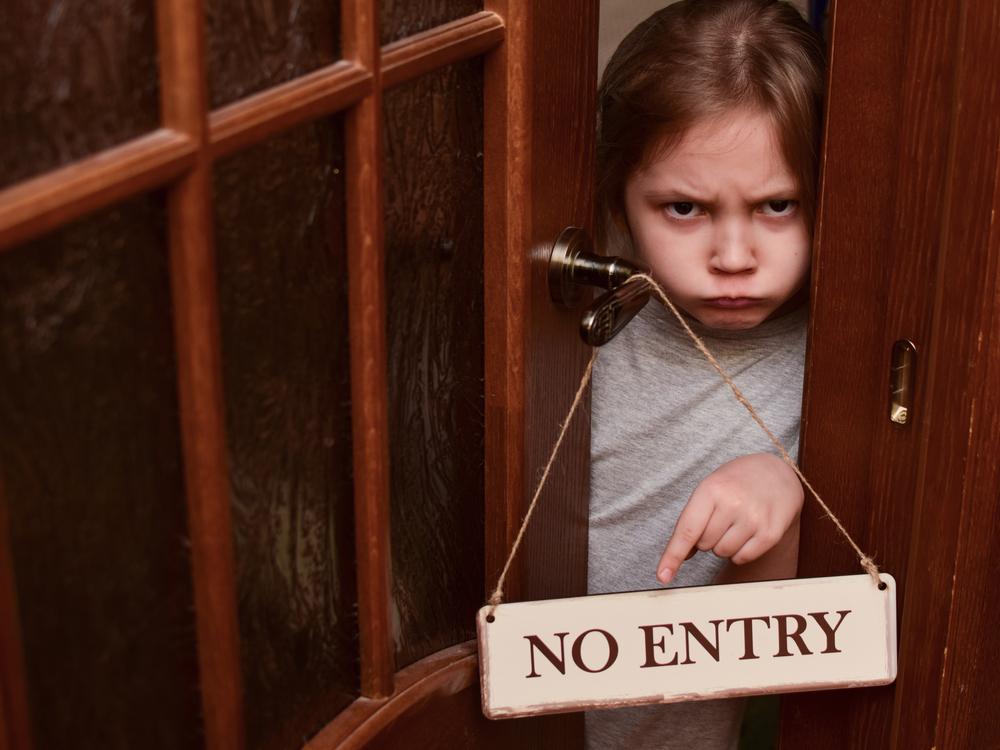While “tough love” parenting has been passed down through generations with the best intentions, the research is pretty clear: many of these approaches can leave lasting emotional scars. Maybe you were following the parenting playbook you inherited or believed being strict would prepare them for a harsh world. But those tough love tactics often create the problems they’re trying to prevent. Let’s explain how these supposedly character-building moments might’ve shaped your kids in unexpected and traumatic ways.
1. Saying “Stop Crying” Created Emotional Walls

When you told them to “stop crying” or “toughen up,” your intention may have been to help them develop resilience, but the impact was far different. According to Psychology Today, tough love can backfire, and its harsh style is widely considered a form of verbal abuse and manipulation. Instead of learning to manage emotions, they learned to suppress them entirely, seeing vulnerability as a weakness. Over time, this created an emotional wall that kept their true feelings hidden, even from themselves. As adults, they struggle to open up, even when they desperately want to. They may view expressing sadness or fear as a failure, leaving them emotionally disconnected in relationships. What you thought was a lesson in toughness became a lesson in emotional numbness.
This lack of emotional openness also affects how they handle challenges. Rather than seeking help or sharing their struggles, they internalize everything, which can lead to burnout, anxiety, or depression. They may struggle to build trust or form deep connections in their personal and professional lives. By stifling their tears, they also stifled their ability to process and express their emotions. Emotional resilience isn’t about avoiding tears but facing them and moving through them with strength and self-awareness.
2. Giving Them The Silent Treatment Taught Unhealthy Communication

When you gave them the silent treatment after they misbehaved, it probably felt like an effective way to make them reflect on their actions. Instead, it taught them that love and communication could be withheld as punishment. According to USA Today giving kids the silent treatment makes them feel emotionally abandoned. This emotional withdrawal didn’t help them learn accountability—it taught them avoidance. As adults, they’ve internalized this pattern, using silence as a weapon in their relationships. When conflict arises, they ghost people, withdraw emotionally, or completely shut down rather than working through issues.
Your silent treatment may have also given them a warped view of how love works. They might believe affection is conditional and that connection can be revoked when mistakes are made. This mindset often makes it difficult for them to navigate conflicts healthily. They avoid tough conversations, fearing rejection or abandonment, leaving unresolved issues to fester. Healthy communication thrives on openness and consistency, not on withholding. Unfortunately, the lesson they learned was that silence is power, not resolution.
3. Comparing Them To Others Created Self-Doubt

Comparing them to their siblings or other people made them feel like they weren’t enough, as they were constantly chasing someone else’s standard. This comparison creates a deep-rooted insecurity that follows them into adulthood. Some may respond by becoming overachievers, exhausting themselves in a relentless quest to prove their worth. Others may retreat altogether because they have developed a fear of failure or rejection, according to Integrative Pysch. In relationships, this self-doubt often manifests in unhealthy ways. They may find themselves constantly comparing their partners to others or assuming their partners are comparing them unfavorably.
These insecurities can create a cycle of jealousy, mistrust, or self-sabotage. Instead of feeling secure in their unique qualities, they are haunted by the belief that they’ll never measure up. They needed encouragement to be authentic, not a standard set by someone else’s achievements.
4. Saying “Because I Said So” Led to Poor Decision-Making

When you enforced rules with “because I said so,” it may have felt like an effective way to establish authority, but it also stifled their ability to think critically. They learned to follow orders without understanding their reasoning, which didn’t prepare them for the real-world challenges of independent decision-making. As adults, they might swing to two extremes: either blindly following authority figures or rebelling against every rule they encounter; one writer explained she did the latter in an article in PopSugar. Neither response allows them to engage thoughtfully with rules or decisions. This approach also robbed them of the opportunity to develop problem-solving skills.
Instead of learning to weigh the pros and cons, they relied on external validation or guidance to make choices. This dependency can affect every aspect of their lives, from careers to relationships. Understanding the “why” behind rules fosters accountability and empowerment, but being shut out of that process leaves them floundering when they need to take the lead. Explaining the reasoning behind decisions isn’t coddling—it’s teaching.
5. Publicly Shaming Them Confused Them About Love

Calling them out in front of others might have seemed like a way to correct behavior quickly, but it taught them something far more damaging: that love and humiliation can coexist. Public shaming left them questioning whether they were truly valued, creating a link between love and conditional acceptance. These moments didn’t just hurt in the moment—they linger, shaping how they see themselves and their relationships. As adults, they might either fear being humiliated or struggle with boundaries, accepting mistreatment as a normal part of love.
Shame is a powerful emotion; it can create lasting wounds when used as a teaching tool. They may now equate love with judgment, making it hard to trust or open up in relationships. Instead of feeling safe and supported, they approach connections with hesitation, fearing ridicule. Discipline and accountability are important, but so is preserving someone’s dignity. Teaching through compassion rather than shame fosters resilience and security—not emotional scars.
6. Being Overprotective Stifled Their Resilience

Shielding them from every disappointment or failure may have felt like love in action, but it also prevented them from building the resilience they need to navigate life’s challenges. Overprotection sent the message that the world is a scary, unsafe place they’re not equipped to handle. Now, as adults, they might find themselves paralyzed by fear when faced with risk or uncertainty. Decisions become overwhelming because they’ve never been allowed to experience the consequences of their choices. While your intentions were rooted in care, the result is often anxiety and self-doubt.
On the other hand, some may rebel entirely, rushing headlong into risky situations because they were never taught how to approach challenges with balance and caution. They might struggle to trust their own instincts or feel resentful about the limits placed on their childhood. Life’s setbacks are inevitable, but facing them head-on fosters the strength and self-assurance that overprotection often stifles. By stepping back and allowing kids to experience small failures, parents can help them build the confidence to navigate bigger challenges later in life.
7. Yelling Instilled Fear, Not Respect

Yelling might have felt like an effective way to get their attention in the heat of the moment, but it taught them to fear you rather than respect you. Instead of focusing on the lesson you were trying to impart, they were consumed by the overwhelming emotion of being yelled at. Fear-based parenting often creates children who comply out of anxiety, not understanding or trust. As adults, they may struggle with confrontation, avoiding it entirely or reacting defensively when faced with criticism.
This approach also chips away at self-esteem. Being yelled at repeatedly can make them internalize the message that they’re inherently bad or incapable. Over time, this can lead to feelings of inadequacy and shame. While discipline is important, communication is more effective when it’s calm and constructive. Teaching through respect, rather than fear, builds a foundation of mutual trust that carries over into adulthood. Yelling might feel powerful in the moment, but it often leaves emotional scars that take years to heal.
8. Punishing Them For Their Mistakes Created Perfectionists

When mistakes were met with harsh punishment, the message they received was that failure is unacceptable. This often creates adults who are terrified of making mistakes, leading them to strive for perfection in every aspect of their lives. While perfectionism might seem like a desirable trait, it’s often a double-edged sword. They push themselves to unrealistic standards, and any perceived failure feels catastrophic. This constant pressure can lead to anxiety, burnout, and an inability to take risks.
On the flip side, some may give up entirely, believing they’ll never measure up no matter how hard they try. Punishing mistakes also stifles creativity and problem-solving, as they become more focused on avoiding failure than exploring possibilities. What they needed wasn’t punishment but guidance on how to learn and grow from their errors. Mistakes are opportunities for growth, not just moments for discipline. By embracing failure as a natural part of life, they could have developed the resilience and adaptability needed to thrive.
9. Ignoring Their Opinions Ruined Their Confidence

Dismissing their opinions with comments like “You don’t know what you’re talking about” or “You’re too young to understand” might have felt like a way to assert authority, but it sent a deeper message: their voice didn’t matter. When kids feel unheard, they stop speaking up altogether, assuming their thoughts and feelings are unimportant. As adults, they might struggle to advocate for themselves in relationships, workplaces, or any setting where confidence is required. They second-guess their decisions, fearing judgment or rejection.
On the other hand, some may overcompensate, insisting their opinions be heard at all costs, sometimes in unhealthy or confrontational ways. Either way, the root of the issue is the same: a lack of confidence in their own voice. Teaching kids that their perspectives are valid, even if they’re not always right, helps them develop critical thinking and self-assurance. Listening doesn’t mean agreeing—it means showing respect and encouraging dialogue. By valuing their input, you foster a sense of worth that carries into adulthood.
10. Showing Them Conditional Love Made Them People-Pleasers

When love was tied to achievements or good behavior—like only showing affection when they excelled in school or behaved perfectly—it taught them that love is something to be earned, not freely given. This conditional love often creates adults who are people-pleasers, constantly seeking validation and approval. They’ll go out of their way to make others happy, often at the expense of their own needs and well-being. Their fear of rejection or disapproval drives them to avoid conflict, even when it’s necessary.
This dynamic can also lead to resentment and burnout, as they pour themselves into pleasing others while neglecting their own happiness. Deep down, they may feel unworthy of love unless they’re meeting impossibly high standards. What they needed as kids was unconditional support—a reminder that love isn’t tied to performance. By separating behavior from worth, parents can teach kids that they’re valued for who they are, not just what they do. Unconditional love creates confidence and security, while conditional love fosters anxiety and self-doubt.
11. Criticizing Their Interests Stifled Their Authenticity

When you dismissed their hobbies or interests as “a waste of time” or “not practical,” it sent a powerful message: their passions didn’t matter. Even if your intentions were to steer them toward what you believed was more meaningful, the effect was to chip away at their sense of self. They learned to hide the things that brought them joy or abandon them altogether, fearing judgment or ridicule. As adults, they might struggle to connect with what genuinely makes them happy, choosing instead to pursue paths that align with others’ expectations rather than their own.
This dynamic can also create a lingering fear of expressing their individuality, leaving them hesitant to explore new interests or take creative risks. Authenticity is key to happiness, and when kids feel their passions are invalidated, they lose touch with what makes them unique. Encouraging their interests, no matter how unconventional, fosters confidence and self-expression. Even if those hobbies don’t turn into lifelong pursuits, they teach the value of exploration and creativity. Supporting their passions isn’t just about the activity itself—it’s about showing that their choices and identities are valued.
12. Overemphasizing Success Made Them Fear Failure

When achievements were celebrated more than effort, it sent the message that success was all that mattered. They grew up feeling like they always had to win, whether it was in academics, sports, or other endeavors. This constant pressure to excel left them terrified of failure, seeing it not as a learning opportunity but as a personal flaw. Now, as adults, they might avoid challenges altogether for fear of falling short, or they might push themselves to the brink, striving for perfection at all costs.
This success-at-all-costs mindset often leads to burnout, anxiety, and an inability to enjoy their accomplishments. They never learned that failure is a natural and essential part of growth. What they needed was praise for effort, creativity, and resilience rather than just results. Emphasizing the process over the outcome helps kids develop a growth mindset, where setbacks are seen as stepping stones rather than insurmountable obstacles. Success is important, but so is the ability to bounce back and keep going when things don’t go as planned.
13. Not Allowing Independence Stunted Their Growth

When you micromanaged their every decision or took over whenever they struggled, you may have thought you were being helpful. Instead, you taught them that they couldn’t trust themselves to make good choices. This lack of independence stunted their confidence, leaving them reliant on others for guidance in adulthood. Now they might second-guess even simple decisions, or they could swing to the other extreme, rejecting any advice as a way to assert control.
Independence is a skill that needs to be nurtured, not suppressed. By stepping in too often, you denied them the chance to build self-reliance and problem-solving abilities. Learning to navigate challenges and live with the consequences of their decisions is essential for growth. Trusting them to figure things out on their own would have taught them resilience and adaptability. Independence doesn’t mean abandoning them—it means guiding them while giving them space to grow.
14. Focusing on Behavior Over Emotions Created Emotional Distance

When your primary focus was on correcting their behavior rather than understanding their feelings, they learned to suppress their emotions to meet expectations. Comments like “Just do what you’re told” or “Stop being so dramatic” taught them that their feelings were irrelevant. Over time, they internalized the idea that emotional expression was something to be hidden, not explored. As adults, they might struggle to identify or process their emotions, creating a disconnect between how they feel and how they act.
This emotional distance also affects their relationships. They might avoid emotional intimacy, fearing judgment or rejection if they show vulnerability. What they needed was validation for their feelings, even if their behavior needed correction. Acknowledging emotions doesn’t mean excusing bad behavior—it means teaching them how to manage those feelings in a healthy way. By focusing on their emotional well-being as much as their actions, you could have created a foundation for trust, empathy, and self-awareness.
15. Inconsistent Parenting Made Them Anxious

When rules and consequences changed depending on your mood, it created a sense of unpredictability that left them feeling unsteady. They grew up never knowing what to expect, which often translates into heightened anxiety in adulthood. This inconsistency taught them to walk on eggshells, constantly adjusting their behavior to avoid upsetting others. Now, as adults, they might struggle with setting boundaries, fearing conflict, or feeling like they have to earn love and stability. Predictability is a key component of emotional security, especially for children.
When boundaries and expectations are clear, kids learn to trust their environment and the people around them. Inconsistent parenting erodes that trust, leaving lasting emotional scars. What they needed was not perfection but consistency—a stable framework where they knew what to expect and how to navigate challenges. Emotional security in childhood creates confidence and resilience, while unpredictability fosters doubt and fear.








